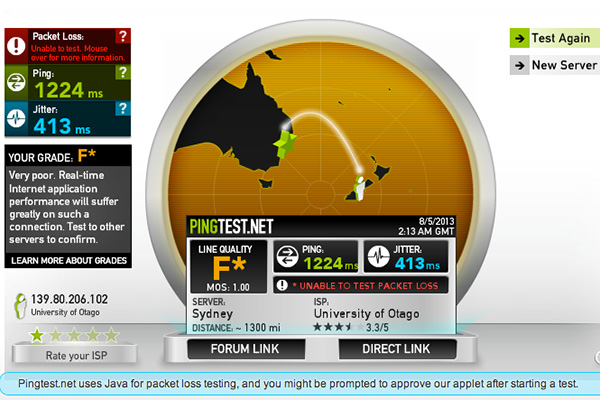Internet Totally Shithouse
The University’s Information Technology Services (ITS) never responded to Critic’s multiple requests for comment. ITS is the central ICT division of the University of Otago and is the eighth-largest ICT operation in New Zealand, accommodating 17,000 devices on its network and processing over three million emails every day. With 155 equivalent full-time employees and an operating budget of $41.5 million, not to mention $14 million extra for capital expenditure, the longevity of the current network issues – and ITS’ avoidance of Critic’s questions – has come as a surprise.
In the ITS Divisional Plan 2013/2014, “continuing to demonstrate … responsiveness to our customers” was identified as a key issue facing ITS, words that now sound very prescient.
The plan also outlined a schedule for the University’s network upgrades. Although work on the wireless network upgrade (which aims to create a “wireless cocoon” across campus) was expected this year through to September, the general university network upgrade is an ongoing work in progress aimed at replacing old equipment and should not cause such significant issues as those recently experienced.
These network upgrades are part of a $19 million revamp announced in 2012; however, no indication has been provided of what stage these upgrades have reached. The University has also discussed plans to provide free wireless to staff and students living in greater North Dunedin, which has raised concerns among those affected by the current network speed that it could further dilute the service and make access even more frustrating.
At the time Critic went to print, ITS also had not updated their Service Statistics web page since May this year.
Students reported to Critic that although the ITS system had been updated, it still will not let students print from laptops despite promises to introduce this service. Furthermore, students reported having problems with support for at least the last two major Mac OSX releases, despite most students being sent to study in Dunedin with the shining aluminium devices as parting gifts from tired-of-adolescence parents.
An outage on the evening of Thursday 8 August took all off-campus networks and all connections to the Data Centre offline. This was “urgent maintenance … expected to improve the slow network response some people have been experiencing.” Critic points out that over the course of several weeks while these issues were occurring, this was the first time ITS had publicly acknowledged there was a problem with the network. Critic is also astounded by the University’s ability to shrink “all people” into “some people.”
Over the course of last week, Critic tested the network speed with various online tools. Over this period, speeds of 0.1Mbps were not uncommon. Standard Dial-up internet is about 0.05Mbps. This makes life difficult when doing anything in the wonderful 21st century and is the first time Critic members have ever obtained an “OCKLA F Grade” for an Internet connection. Before going to print last Thursday, Critic tried to test the speed again. However, the Internet was so slow that the test page would not load.
In comparison, the fibre broadband to which most Dunedin students now have access provides a minimum speed of 20Mbps (and hits a maximum of 100Mbps), which is at least 200x faster than the speeds currently experienced on campus. On this note, however, many students have speculated that the University is deliberately stalling its current upgrades while waiting to convert the entire network to such a fibre system.
The cost of the Internet to students is separated between that allocated for course-related content, which is covered by tuition fees, and Internet for personal use, which is covered by the student services fee. The cost for personal Internet usage is set at $39.54 per student per year, and allows each student up to 30GB of use per month. Critic understands the split between these allocations is relatively arbitrary.
The list and definitions of ITS-blocked websites have also been criticised after becaming even more stringent this year. As previously reported, the list of banned sites includes Critic’s App of the Week for 22 July, the sex education tool HappyPlayTime. The site is blocked as “other adult materials,” even though the University’s definition of “adult materials” is meant to exclude sex education.
It remains an inadequately addressed issue with ITS whether porn should be blocked. Halls of residence, for example, are home to thousands of people. It has long been questioned why the University attempts to control what students view in their leisure and pleasure time.




